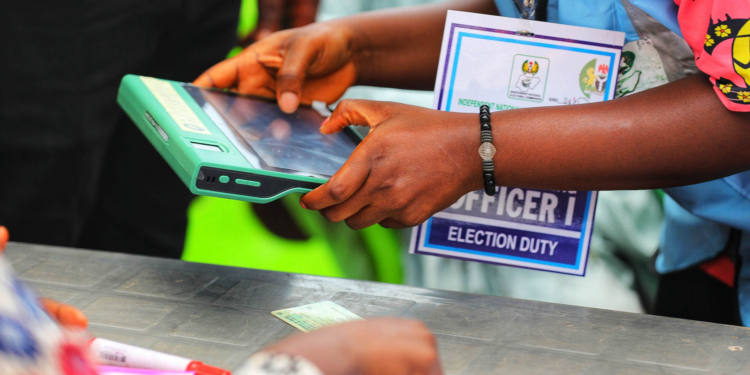The Independent National Electoral Commission (INEC)says the use of Bimodal Voter Accreditation System (BVAS) and Result Viewing (IReV) portal for accreditation and transmission of election results, has come to stay in Nigeria.
INEC Chairman, Prof. Mahmood Yakubu said this at the opening of a training for 82 master trainers on election technology for 2023 general election in Abuja on Tuesday.
He said that INEC needed to build the capacity of its staff not only to competently handle the devices during the accreditation process but to also respond effectively to any glitche that may occur during election.
“Over the last two years, the commission has increased the deployment of technology in the elections in Nigeria.
“Systems and portals have been designed and developed to cater for different electoral activities ranging from voter registration and accreditation, result transmission from the polling units, the nomination of candidates by political parties to the accreditation of polling agents, observers and journalists for election.
“Of these innovations, most Nigerians are more familiar with the BVAS which doubles as a device for accreditation as well as the upload of the Polling Unit level result sheets to the INEC Result Viewing (IReV) portal in real-time on election day.
“These innovations have increased transparency and public confidence in the electoral process. They are also part of the legal requirements for conducting elections in Nigeria,” he said.
Yakubu said that from the experiences in the recent off-cycle election, INEC was convinced that a critical factor in the deployment of technology in election was training.
“Our plan for the 2023 general election is to commence the training of election officials early and for a longer period of time for optimal understanding of the processes and procedures in order to serve Nigerians better.
“A key component of this effort is election technology.
“Today, we begin the process with the training of master trainers to serve as Registration Area Technical Support (RATECH).
“A total of 82 officials drawn from our offices nationwide will form the nucleus of the training. Over the next three days, they will receive intensive hands-on training on the new technology,” he said.
Yakubu added:“Thereafter, they will train more officials at zonal level to cover all the 8,809 Registration Areas (or Wards). In turn, these officials will be involved in the training ad hoc staff for the 176,846 Polling Units nationwide.’’
He urged the 82 INEC staff involved in the training to pay special attention adding that the commission would not accept laxity on their part.
Prof. Abdullahi Zuru, the Chairman, The Electoral Institute (TEI), said it was necessary for electoral officers to know and understand how to use the technology devices.
Zuru said that INEC underlying philosophy was to ensure that Election officials imbibe the right knowledge, skill sets and attitude needed for the discharge of their duties and responsibilities towards the conduct of free, fair, credible, inclusive and transparent election.
“As we are all aware, the Commission will deploy several technologies in the conduct of the 2023 General elections in compliance with Sections 47(2), 60(4) and 64(4) of the Electoral Act 2022 and the INEC Regulations and Guidelines for the conduct of election.
“Therefore, this training is of utmost significance as it further builds your capacity as the Commission’s Master Trainers who coordinate training at strategic levels, thereby enhancing the credibility and integrity of the electoral process.
“Particularly significant are the Electronic Voters Register (EVR), Permanent Voters Card (PVC), Bimodal Voters Accreditation System (BVAS) and the INEC Results Viewing Portal (IReV) which are the determinants of the true winner of an election: “They ensure that every valid vote counts,’’ Zuru said.








Discussion about this post